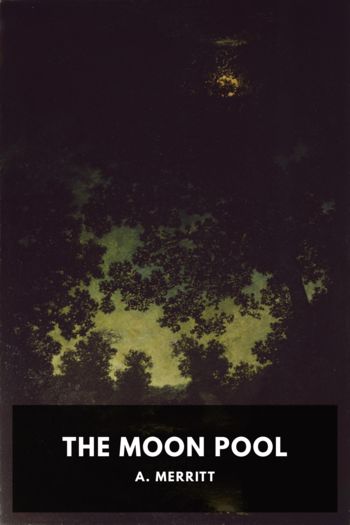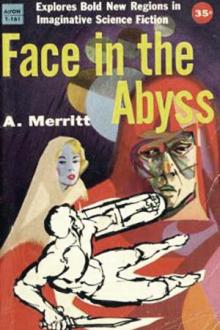The Moon Pool - A. Merritt (top novels .TXT) 📗

- Author: A. Merritt
Book online «The Moon Pool - A. Merritt (top novels .TXT) 📗». Author A. Merritt
“And opposite this place of the sun king is the moon rock that hides the Moon Pool.
“It was Stanton who discovered the moon rock. We had been inspecting the inner courtyard; Edith and Thora were getting together our lunch. I came out of the vault of Chau-te-leur to find Stanton before a part of the terrace studying it wonderingly.
“ ‘What do you make of this?’ he asked me as I came up. He pointed to the wall. I followed his finger and saw a slab of stone about fifteen feet high and ten wide. At first all I noticed was the exquisite nicety with which its edges joined the blocks about it. Then I realized that its colour was subtly different—tinged with grey and of a smooth, peculiar—deadness.
“ ‘Looks more like calcite than basalt,’ I said. I touched it and withdrew my hand quickly for at the contact every nerve in my arm tingled as though a shock of frozen electricity had passed through it. It was not cold as we know cold. It was a chill force—the phrase I have used—frozen electricity—describes it better than anything else. Stanton looked at me oddly.
“ ‘So you felt it too,’ he said. ‘I was wondering whether I was developing hallucinations like Thora. Notice, by the way, that the blocks beside it are quite warm beneath the sun.’
“We examined the slab eagerly. Its edges were cut as though by an engraver of jewels. They fitted against the neighbouring blocks in almost a hairline. Its base was slightly curved, and fitted as closely as top and sides upon the huge stones on which it rested. And then we noted that these stones had been hollowed to follow the line of the grey stone’s foot. There was a semicircular depression running from one side of the slab to the other. It was as though the grey rock stood in the centre of a shallow cup—revealing half, covering half. Something about this hollow attracted me. I reached down and felt it. Goodwin, although the balance of the stones that formed it, like all the stones of the courtyard, were rough and age-worn—this was as smooth, as even surfaced as though it had just left the hands of the polisher.
“ ‘It’s a door!’ exclaimed Stanton. ‘It swings around in that little cup. That’s what makes the hollow so smooth.’
“ ‘Maybe you’re right,’ I replied. ‘But how the devil can we open it?’
“We went over the slab again—pressing upon its edges, thrusting against its sides. During one of those efforts I happened to look up—and cried out. A foot above and on each side of the corner of the grey rock’s lintel was a slight convexity, visible only from the angle at which my gaze struck it.
“We carried with us a small scaling-ladder and up this I went. The bosses were apparently nothing more than chiseled curvatures in the stone. I laid my hand on the one I was examining, and drew it back sharply. In my palm, at the base of my thumb, I had felt the same shock that I had in touching the slab below. I put my hand back. The impression came from a spot not more than an inch wide. I went carefully over the entire convexity, and six times more the chill ran through my arm. There were seven circles an inch wide in the curved place, each of which communicated the precise sensation I have described. The convexity on the opposite side of the slab gave exactly the same results. But no amount of touching or of pressing these spots singly or in any combination gave the slightest promise of motion to the slab itself.
“ ‘And yet—they’re what open it,’ said Stanton positively.
“ ‘Why do you say that?’ I asked.
“ ‘I—don’t know,’ he answered hesitatingly. ‘But something tells me so. Throck,’ he went on half earnestly, half laughingly, ‘the purely scientific part of me is fighting the purely human part of me. The scientific part is urging me to find some way to get that slab either down or open. The human part is just as strongly urging me to do nothing of the sort and get away while I can!’
“He laughed again—shamefacedly.
“ ‘Which shall it be?’ he asked—and I thought that in his tone the human side of him was ascendant.
“ ‘It will probably stay as it is—unless we blow it to bits,’ I said.
“ ‘I thought of that,’ he answered, ‘and I wouldn’t dare,’ he added soberly enough. And even as I had spoken there came to me the same feeling that he had expressed. It was as though something passed out of the grey rock that struck my heart as a hand strikes an impious lip. We turned away—uneasily, and faced Thora coming through a breach on the terrace.
“ ‘Miss Edith wants you quick,’ she began—and stopped. Her eyes went past me to the grey rock. Her body grew rigid; she took a few stiff steps forward and then ran straight to it. She cast herself upon its breast, hands and face pressed against it; we heard her scream as though her very soul were being drawn from her—and watched her fall at its foot. As we picked her up I saw steal from her face the look I had observed when first we heard the crystal music of Nan-Tauach—that unhuman mingling of opposites!”
IV The First Vanishings“We carried Thora back, down to where Edith was waiting. We told her what had happened and what we had found. She listened gravely, and as we finished Thora sighed and opened her eyes.
“ ‘I would like to see the stone,’ she said. ‘Charles, you stay here with Thora.’ We passed through the outer court silently—and stood before the rock.





Comments (0)